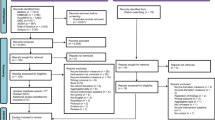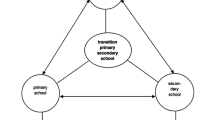Abstract
Integrating an early childhood development (ECD) intervention within routine healthcare visits offers an important opportunity for a population-level approach to support ECD in low- and middle-income countries (LMICs) where 250 million children under the age of 5 years fail to reach their full developmental potential. This paper reports on the feasibility of integrating an adapted healthcare-based ECD intervention (Sit Down and Play) in primary health centers (PHCs) serving low-income rural communities in Karnataka, India, and its potential to support research-informed components needed to improve ECD (e.g., opportunities for learning). Using a prospective cluster nonrandomized pilot and feasibility trial, caregivers with infants 6–10 weeks of age were recruited from 2 PHCs: one which delivered the intervention at two subsequent immunization visits (n = 25) and the other as care as usual (n = 28). Feasibility was assessed using the following indicators: implementation, practicality, acceptability, demand, and limited efficacy. Quality of home stimulation and opportunities for learning were explored with key items from the UNICEF Multiple Cluster Index Surveys with generalized estimating equation models. While outcome measures were to be obtained from all participants 3-month post-enrollment, due to COVID19 restrictions, there was variability in timing of follow-up interviews; however, outcome data from all participants were obtained and no significant group differences existed in contact time. Results suggest the feasibility of delivery of SDP during routine immunization visits, high satisfaction with adapted content, and utility of developed training and fidelity measures. Though not powered for hypothesis testing, our exploratory analyses reveal the intervention group demonstrated greater improvements on quality of home stimulation over time than the control group.
Conclusion: Our findings suggest integrating an ECD intervention with routine healthcare visits is a feasible and promising strategy for supporting ECD in India. Further studies are needed to determine the effectiveness of SDP on children’s development.
Trial registration: ClinicalTrials.gov Identifier: NCT04167254.
What is Known: • Interventions are increasingly being developed to target responsive caregiving and opportunities for learning because of their potential to support early childhood development (ECD) in low- and middle-income countries where 250 million children under the age of 5 years fail to reach their full developmental potential. • A critical issue in ECD intervention research is the gap between what is known to be effective treatment to protect healthy brain development and what is provided to millions of caregivers during routine care who live in low-income communities. | |
What is New: • We adapted a brief, ECD intervention for use with routine healthcare visits in India as a population-level strategy to support ECD in LMICs. • Our results demonstrate feasibility, acceptability, and improvements in key parenting behaviors that promote ECD. |


Similar content being viewed by others
Availability of data and material
The datasets generated during and/or analyzed during the current study are available from the corresponding author on reasonable request.
Abbreviations
- ASHA:
-
Accredited social health activists
- ECD:
-
Early childhood development
- GEE:
-
Generalized estimating equation
- LMICs:
-
Low- and middle-income countries
- MICS:
-
Multiple Indicator Cluster Surveys Early Childhood Development Module
- PHC:
-
Primary health center
- SDP:
-
Sit Down and Play
- SCT:
-
Social cognitive theory
- UNICEF:
-
United Nations Children’s Emergency Fund
- WHO:
-
World Health Organization
References
Black MM, Walker SP, Fernald LC et al (2017) Early childhood development coming of age: science through the life course. The Lancet 389:77–90
Lu C, Black MM, Richter LM (2016) Risk of poor development in young children in low-income and middle-income countries: an estimation and analysis at the global, regional, and country level. Lancet Glob Health 4:e916–e922. https://doi.org/10.1016/S2214-109X(16)30266-2
Andrew A, Attanasio O, Augsburg B et al (2020) Effects of a scalable home-visiting intervention on child development in slums of urban India: evidence from a randomised controlled trial. J Child Psychol Psychiatry 61:644–652. https://doi.org/10.1111/jcpp.13171
Bhopal S, Roy R, Verma D et al (2019) Impact of adversity on early childhood growth & development in rural India: findings from the early life stress sub-study of the SPRING cluster randomised controlled trial (SPRING-ELS). PLoS ONE 14:e0209122. https://doi.org/10.1371/journal.pone.0209122
Hermida MJ, Shalom DE, Segretin MS et al (2019) Risks for child cognitive development in rural contexts. Front Psychol. https://doi.org/10.3389/fpsyg.2018.02735
Heckman JJ, Moon SH, Pinto R et al (2010) The rate of return to the HighScope Perry Preschool Program. J Public Econ 94:114–128
Duncan GJ, Dowsett CJ, Claessens A et al (2007) School readiness and later achievement. Dev Psychol 43:1428
Medicine I of (2000) From neurons to neighborhoods: the science of early childhood development. The National Academies Press, Washington, DC
Engle P, Black M (2008) The effect of poverty on child development and educational outcomes. Ann N Y Acad Sci 1136:243–256. https://doi.org/10.1196/annals.1425.023
Grantham-McGregor S, Cheung YB, Cueto S et al (2007) Developmental potential in the first 5 years for children in developing countries. The lancet 369:60–70
Noble KG, Engelhardt LE, Brito NH et al (2015) Socioeconomic disparities in neurocognitive development in the first two years of life. Dev Psychobiol 57:535–551. https://doi.org/10.1002/dev.21303
Batalle D, Edwards AD, O’Muircheartaigh J (2018) Annual research review: not just a small adult brain: understanding later neurodevelopment through imaging the neonatal brain. J Child Psychol Psychiatry 59:350–371. https://doi.org/10.1111/jcpp.12838
Patel V, Saxena S, Lund C et al (2018) The Lancet Commission on global mental health and sustainable development. The Lancet 392:1553–1598. https://doi.org/10.1016/S0140-6736(18)31612-X
Walker SP, Wachs TD, Grantham-McGregor S et al (2011) Inequality in early childhood: risk and protective factors for early child development. The Lancet 378:1325–1338. https://doi.org/10.1016/S0140-6736(11)60555-2
Bhutta ZA, Guerrant RL, Nelson CA (2017) Neurodevelopment, nutrition, and inflammation: the evolving global child health landscape. Pediatrics 139:S12–S22. https://doi.org/10.1542/peds.2016-2828D
Fox SE, Levitt P, Nelson CA (2010) How the timing and quality of early experiences influence the development of brain architecture. Child Dev 81:28–40. https://doi.org/10.1111/j.1467-8624.2009.01380.x
Arora NK, Nair MKC, Gulati S et al (2018) Neurodevelopmental disorders in children aged 2–9 years: population-based burden estimates across five regions in India. PLoS Med 15:e1002615. https://doi.org/10.1371/journal.pmed.1002615
World Health Organization (2015) Health in 2015: from MDGs, Millennium Development Goals to SDGs, Sustainable Development Goals. World Health Organization, Geneva
Improving early childhood development: WHO guideline. Geneva: World Health Organization; 2020. Licence: CC BY-NC-SA 3.0 IGO https://www.who.int/publications-detail/improving-early-childhood-development-who-guideline. Accessed 1 Apr 2020
Dua T, Tomlinson M, Tablante E et al (2016) Global research priorities to acelerate early child development in the sustainable development era. Lancet Glob Health 4:e887–e889. https://doi.org/10.1016/S2214-109X(16)30218-2
Aboud FE, Yousafzai AK (2015) Global health and development in early childhood. Annu Rev Psychol 66:433–457. https://doi.org/10.1146/annurev-psych-010814-015128
Hamadani JD, Mehrin SF, Tofail F et al (2019) Integrating an early childhood development programme into Bangladeshi primary health-care services: an open-label, cluster-randomised controlled trial. Lancet Glob Health 7:e366–e375. https://doi.org/10.1016/S2214-109X(18)30535-7
Khan MA, Owais SS, Maqbool S et al (2018) Is integrated private-clinic based early child development care effective? A clustered randomised trial in Pakistan. BJGP Open. https://doi.org/10.3399/bjgpopen18X101593
Chang SM, Grantham-McGregor SM, Powell CA et al (2015) Integrating a parenting intervention with routine primary health care: a cluster randomized trial. Pediatrics 136:272–280. https://doi.org/10.1542/peds.2015-0119
Aboud FE, Singla DR, Nahil MI, Borisova I (2013) Effectiveness of a parenting program in Bangladesh to address early childhood health, growth and development. Soc Sci Med 97:250–258. https://doi.org/10.1016/j.socscimed.2013.06.020
Yousafzai AK, Aboud FE, Nores M, Kaur R (2018) Reporting guidelines for implementation research on nurturing care interventions designed to promote early childhood development. Ann N Y Acad Sci 1419:26–37. https://doi.org/10.1111/nyas.13648
Shah R, DeFrino D, Kim Y, Atkins M (2017) Sit Down and Play: a preventive primary care-based program to enhance parenting practices. J Child Fam Stud 26:540–547. https://doi.org/10.1007/s10826-016-0583-6
Shah R, Isaia A, Schwartz A, Atkins M (2019) Encouraging parenting behaviors that promote early childhood development among caregivers from low-income urban communities: a randomized static group comparison trial of a primary care-based parenting program. Matern Child Health J 23:39–46. https://doi.org/10.1007/s10995-018-2589-8
Bowen DJ, Kreuter M, Spring B et al (2009) How we design feasibility studies. Am J Prev Med 36:452–457. https://doi.org/10.1016/j.amepre.2009.02.002
Leon AC, Davis LL, Kraemer HC (2011) The role and interpretation of pilot studies in clinical research. J Psychiatr Res 45:626–629. https://doi.org/10.1016/j.jpsychires.2010.10.008
Indian Public Health Standards (2012) Guidelines for Primary Health Centers. Directorate General of Health Services. Ministry of Health and Family Welfare. Government of India; Revised. http://www.nhm.gov.in/images/pdf/guidelines/iphs/iphs-revised-guidlines-2012/primay-health-centres.pdf. Accessed 14 Jul 2021
Sriram S (2018) Availability of infrastructure and manpower for primary health centers in a district in Andhra Pradesh, India. J Family Med Prim Care 7:1256–1262. https://doi.org/10.4103/jfmpc.jfmpc_194_18
Chokshi M, Patil B, Khanna R et al (2016) Health systems in India. J Perinatol 36:S9–S12. https://doi.org/10.1038/jp.2016.184
Julious SA (2005) Sample size of 12 per group rule of thumb for a pilot study. Pharm Stat 4:287–291. https://doi.org/10.1002/pst.185
Bandura A (2004) Health promotion by social cognitive means. Health Educ Behav 31:143–164. https://doi.org/10.1177/1090198104263660
Luoto JE, Lopez Garcia I, Aboud FE et al (2019) Testing means to scale early childhood development interventions in rural Kenya: the Msingi Bora cluster randomized controlled trial study design and protocol. BMC Public Health. https://doi.org/10.1186/s12889-019-6584-9
Shah R, Gustafson E, Dhaded S et al (2020) Integrating an adapted, low-intensity program to promote early childhood development in routine health visits in rural India: a feasibility study. J Dev Behav Pediatr 41:281–288. https://doi.org/10.1097/DBP.0000000000000763
Fernald LCH, Prado E, Kariger P, Raikes A (2017) A toolkit for measuring early childhood development in low-and middle-income countries. p 128
Yousafzai AK, Rasheed MA, Rizvi A et al (2015) Parenting skills and emotional availability: an RCT. Pediatrics 135:e1247–e1257. https://doi.org/10.1542/peds.2014-2335
Raman S, Srinivasan K, Kurpad A et al (2014) My Mother My Sisters and My Friends: sources of maternal support in the perinatal period in urban India. Midwifery 30:130–137. https://doi.org/10.1016/j.midw.2013.03.003
Jeong J, McCoy DC, Yousafzai AK et al (2016) Paternal stimulation and early child development in low- and middle-income countries. Pediatrics 138:e20161357–e20161357. https://doi.org/10.1542/peds.2016-1357
Acknowledgements
The authors would like to thank all the families who participated in this study.
Funding
Research reported in this publication was supported by the Eunice Kennedy Shriver National Institute Of Child Health & Human Development of the National Institutes of Health under award number K23HD086295. The content is solely the responsibility of the authors and does not necessarily represent the official views of the National Institutes of Health.
Author information
Authors and Affiliations
Contributions
Dr. Shah conceptualized and designed the study, obtained funding for the completed study, drafted the initial manuscript, and reviewed and revised the manuscript. Drs. Herekar and Metgud assisted with data collection, assisted with writing the methods section, and reviewed and revised the manuscript. Hajwa Kim conducted the statistical analysis, interpreted the data, and reviewed and provided critical revision of the manuscript. Dr. Atkins contributed to study design and provided critical revision of the manuscript. Dr. Dhaded contributed to study design, assisted with data collection procedures, and provided critical revision of the manuscript. All authors approved the final manuscript as submitted and agree to be accountable for all aspects of the work.
Corresponding author
Ethics declarations
Ethics approval
All procedures performed were in accordance with the ethical standards of the institutional and/or national research committee and with the 1964 Helsinki declaration and later amendments or comparable ethical standards. Study protocol approval was obtained from institutional review boards located at the University of Illinois at Chicago and Jawaharlal Nehru Medical College, Belagavi, India.
Consent to participate
Informed consent was obtained from legal guardians.
Conflict of interest
The authors declare no competing interests.
Additional information
Communicated by Gregorio Paolo Milani.
Publisher's Note
Springer Nature remains neutral with regard to jurisdictional claims in published maps and institutional affiliations.
Rights and permissions
About this article
Cite this article
Shah, R., Herekar, V., Metgud, D. et al. Implementing an early childhood development intervention with routine immunization visits in India: a feasibility trial. Eur J Pediatr 181, 2799–2808 (2022). https://doi.org/10.1007/s00431-022-04485-w
Received:
Revised:
Accepted:
Published:
Issue Date:
DOI: https://doi.org/10.1007/s00431-022-04485-w




